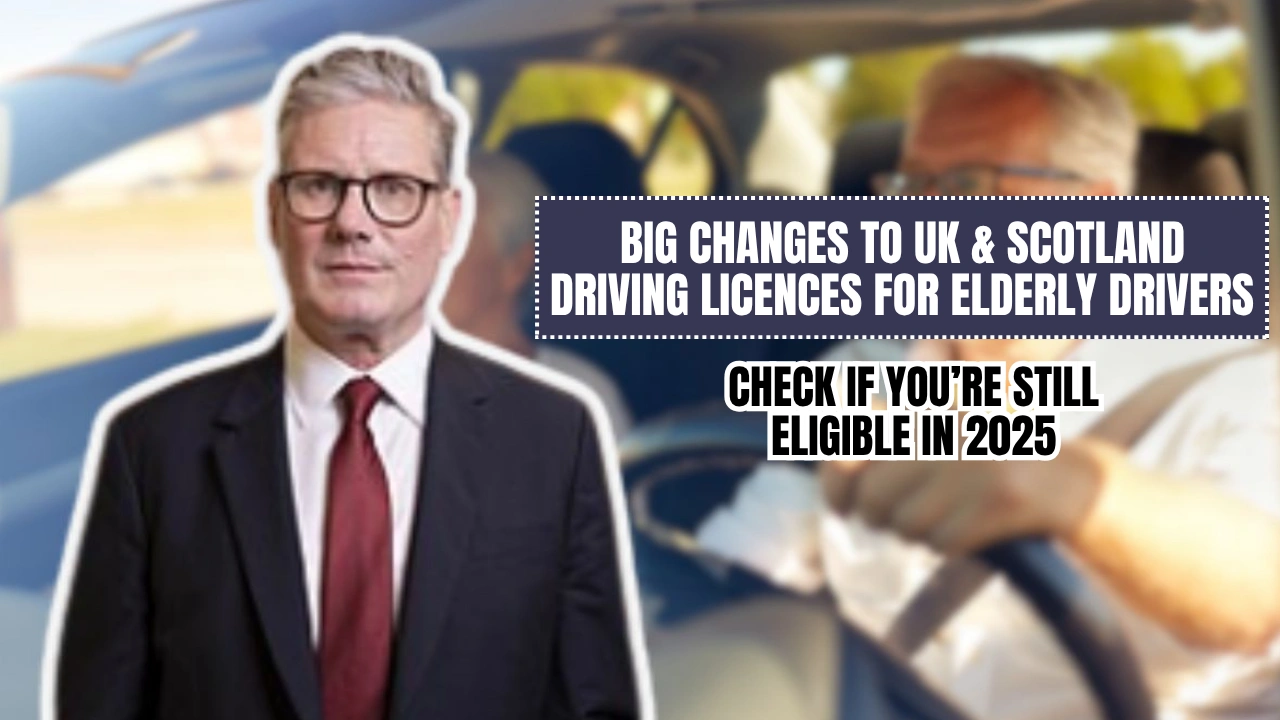Starting in October 2025, elderly drivers across the UK and Scotland will face some of the biggest driving rule changes in recent years. For the first time, anyone aged 70 or older will need to pass a mandatory medical check before they can renew their licence. This change has been introduced to improve safety on the roads and ensure that drivers remain fit to handle vehicles as they age.
The driving licence rules for elderly drivers are now moving away from self-declaration and putting the responsibility on medical professionals to verify fitness. This will impact millions of senior drivers across England, Wales, and Scotland. If you are approaching 70 or already over the age threshold, knowing how these rules work is essential to keep your licence active and continue driving with confidence.
Driving Licence Rules for Elderly Drivers: What to Expect from October 2025
The driving licence rules for elderly drivers are designed to make sure that those behind the wheel are safe, both for themselves and other road users. From October 2025, self-certification will no longer be accepted. Instead, all drivers over 70 will need to complete a medical assessment before their licence can be renewed. This examination includes checks for vision, memory, and general health.
After the results are reviewed, the DVLA can either approve a three-year licence, issue a restricted licence with conditions such as daytime-only driving, or request more testing. For most drivers, this process will be straightforward, but for others with existing health conditions, it may require additional steps. Preparing early for these changes is the best way to avoid delays or complications.
Overview Table: Key Facts About the New Driving Licence Rules
| Aspect | Details |
| Effective Date | 1 October 2025 |
| Affected Drivers | Drivers aged 70 and over in the UK and Scotland |
| Main Change | Mandatory medical exam before licence renewal |
| Medical Checks Included | Vision, cognition, and overall health |
| Renewal Reminder Timing | 90 days before licence expiry |
| Submission Methods | Online via DVLA portal or by post |
| Licence Validity Post-Renewal | 3 years |
| Possible Outcomes | Full renewal, restricted licence, or further testing |
| Health Areas Reviewed | Dementia, glaucoma, stroke, Parkinson’s, heart disease |
| Scotland Consideration | Rules are the same as in England and Wales |
UK is Changing Its Driving Rules for Seniors
Until now, older drivers only needed to sign a declaration saying they were fit to drive. While this worked for decades, concerns have grown about the risks of age-related conditions like poor eyesight, slower reaction times, or memory decline. The updated policy reflects a wider focus on public safety and ensuring that early signs of health issues are picked up before they affect driving.
With these new rules, medical professionals will be at the heart of the renewal process. For drivers aged 70 and above, this means no more ticking a box and sending forms back. Instead, a qualified doctor will need to verify that you are still safe to drive. It is a step toward protecting both senior drivers and everyone else on the road.
Step-by-Step: Renewal Process for Drivers Over 70
If you are turning 70 or already hold a licence, here is how the renewal process will work once the new rules come into force:
1. DVLA Renewal Reminder
Around 90 days before your licence is due to expire, the DVLA will send you a reminder notice. This will give you time to book your medical appointment.
2. Book a Medical Examination
The check-up will cover three key areas:
- Vision tests for clarity, depth perception, and side vision
- Cognitive evaluations for memory and reaction speed
- General health review including medication and pre-existing conditions
3. Submit the Medical Report
Your doctor will fill out a D4 medical form, which you must send to the DVLA either through the online portal or by post.
4. DVLA Decision
Based on your report, the DVLA will decide whether to renew your licence fully, issue a restricted licence, or ask for more testing, such as an on-road assessment.
Health Conditions the DVLA Will Assess Closely
Some health conditions will receive more attention during the medical review. These include:
- Dementia and memory issues that could affect focus and decision-making
- Eye conditions such as cataracts or glaucoma that reduce vision
- Heart disease that increases the risk of sudden medical events
- Recovery from stroke, which can affect coordination and reflexes
- Parkinson’s disease, which may slow down muscle control and reactions
Having one of these conditions does not always mean losing your licence. The DVLA considers each case individually, often with advice from medical experts.
What Happens If Your Licence Renewal Is Denied?
If your medical results suggest you are not fit for a full licence, there are still options available. These include:
- Short-term licences that last one or two years, giving you the chance to be reassessed later
- Restricted licences that allow driving under specific conditions, such as daylight-only or within a local area
- Permission to reapply once your health improves or stabilises
Only in rare cases, where driving is considered too dangerous, will a licence be permanently revoked.
How Seniors Can Prepare for the New Driving Rules
Getting ready for the changes can help avoid stress when the time comes to renew. Here are some practical steps:
- Book regular eye tests and keep your prescription updated
- Keep records of your medical history and medication up to date
- Respond quickly to DVLA reminders when your renewal is due
- Be open and honest with your GP about your health
- Consider taking a driver refresher course if you feel less confident behind the wheel
These small steps can make the process smoother and improve your chances of passing the medical review without issues.
The Bigger Picture
The upcoming changes to the driving licence rules for elderly drivers reflect a shift in how the UK manages road safety for an ageing population. Rather than relying on drivers to self-assess, the system is moving toward professional medical checks that can identify risks early. For many seniors, the process will be easy, but for those with medical concerns, it will require more attention and regular reviews.
This approach also aligns with trends in other countries where populations are ageing, and governments are rethinking how to balance independence with safety. By making these changes, the UK is aiming to protect road users while still supporting older drivers to stay mobile, especially in rural areas where driving is often essential.
FAQs
Q1. When do the new driving licence rules for seniors begin?
The changes will take effect from 1 October 2025 and apply across the UK, including Scotland.
Q2. Will I automatically lose my licence if I have a medical condition?
No. Many conditions are manageable. The DVLA may issue a restricted or short-term licence instead of removing your licence completely.
Q3. How often will drivers over 70 need to renew their licence?
Every three years, as long as the medical assessment confirms they are safe to drive.
Q4. Do these rules apply in Scotland as well?
Yes. The DVLA handles licence renewals across England, Wales, and Scotland, so the same rules apply everywhere.
Q5. Can I continue driving while waiting for my renewal decision?
Yes, as long as your current licence has not expired and you have submitted your medical form, you can continue driving while the DVLA reviews your application.












